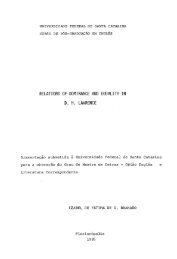AS LEIS DA HOSPITALIDADE – D(errida)entre ética e literatura
AS LEIS DA HOSPITALIDADE – D(errida)entre ética e literatura
AS LEIS DA HOSPITALIDADE – D(errida)entre ética e literatura
You also want an ePaper? Increase the reach of your titles
YUMPU automatically turns print PDFs into web optimized ePapers that Google loves.
Sua lição [a de Francis Ponge] (sua <strong>ética</strong>, sua política, isto é sua filosofia) me interessa<br />
menos (na verdade não a escuto sempre sem murmúrio) do que aquilo a partir do que<br />
ela se constitui e que ele mostra melhor do que ninguém, demonstrando por aí mesmo,<br />
que se duvida muito facilmente, que a instância <strong>ética</strong> trabalha a <strong>literatura</strong> no corpo. É<br />
porque a escutar a lição que ele dá, eu prefiro lê-lo, isto é como uma lição sobre a<br />
moral, e não mais de moral, sobre a genealogia da moral que ele tirou, vamos vê-lo, de<br />
uma moral da genealogia 564 .<br />
Entrecena: a voz livre da mulher desconhecida<br />
nomes de S.<br />
Cena reposta, cena de uma estranha resposta, que nos chega pelo romance Todos os<br />
(Pausa: tomamos conhecimento desta cena antes de ler o trecho de D acima com sua<br />
secretária eletrônica e sua resposta espectral. Mesmo assim, deveremos dizer que ela entra<br />
aqui e agora como um exemplo destes últimos? de uma espectralidade que assombra (hantise),<br />
isto é, do habitar mesmo do “vivente”? Nada menos certo, a começar pelo caráter singular da<br />
resposta que a secretária do romance de S secreta, conforme tentaremos mostrar. Além disso,<br />
“exemplo” ou não coincide, em seu sentido corrente ao menos (caso particular de uma regra<br />
geral), com a gráfica da resposta espectral que o próprio relato encena <strong>–</strong> a exemplaridade e a<br />
unidade da “cena”, justamente, não deixa de ser ela mesma questionável, e a “simplicidade do<br />
564 De Signéponge. Apud Siscar, Marcos. Jacques D<strong>errida</strong>. Rhétorique et philosophie. Op. cit. p. 342. “A<br />
écouter” neste trecho é, quando pouco, dúplice: não se trata somente de uma preferência pela leitura no lugar da<br />
audição (a não ser entendendo no lugar ao pé da letra: uma leitura desdobrando a audição), mas sim de uma<br />
escuta que, por ser atenta ao discurso de Ponge, prefere escutá-lo de outra forma. Na frase anterior, outra<br />
duplicidade marca esta escuta: “a instância <strong>ética</strong> trabalha a <strong>literatura</strong> no corpo”. Restaria definir, se for possível,<br />
todas as instâncias implicadas neste “corpo”. A começar pelo fato de não se poder mexer no corpo do texto<br />
literário, segundo evocávamos anteriormente no que concerne a des-sacralização. Na sua análise do texto de<br />
Kafka, “Before the law”: “We are before this text, saying nothing definite and pesenting no identifiable content<br />
beyond the story itself, except for an endless différance, till death, nonetheless remains strictly intangible.<br />
Intangible: by this I understand inaccessible to contact, impregnable, and ultimately ungraspable,<br />
incomprehensible <strong>–</strong> but also that which we have not the right to touch. This is an ‘original’ text, as we say; it is<br />
forbidden or illicit to change or disfigure it, or to touch its form. Despite the non-identity in itself of its sense or<br />
destination, despite its essential unreadability, its ‘form’ presents and performs itself as a kind of personal<br />
identity entitled to absolute respect. If someone were to change one word or alter a single sentence, a judge could<br />
always declare him or her to have infrunged upon, violated, or disfigured the text. A bad translation will always<br />
be summoned to stand before the original, which supposedly acts as a point of reference, being authorized by its<br />
author or his legal representatives and identified by its title, which according to civil status is its proper name,<br />
and framed between its first and last word. Anyone impairing the original identity of this text may have to appear<br />
before the law. This may happen to any reader in the presence of the text, to critic, publisher, translator, heirs, or<br />
professors. All these are then at the same time doorkeepers and men from the country. On both sides of the<br />
frontier” (“Before the law”. In. Acts of literature. Op. cit. p. 211.<br />
224
















